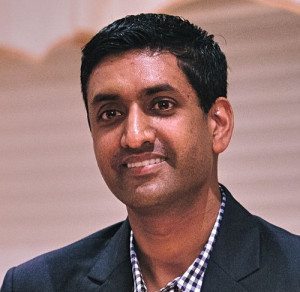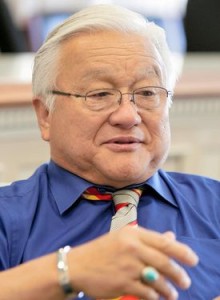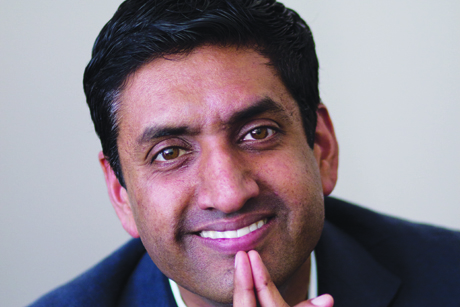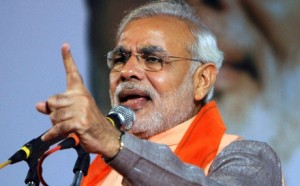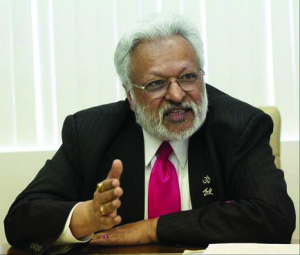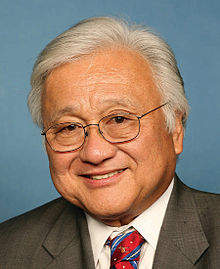
Congressman Mike Honda
Congressman Mike Honda just released a new poll, commissioned on his behalf by Democracy for America. His campaign quickly touted poll numbers that show Honda beating Ro Khanna by around 20 points in a variety of scenarios. However, a close look at the numbers actually suggests that Honda is very vulnerable to losing the election.
The poll is actually four different polls (see below for results), each with one question. In the first instance, voters were asked whether they would vote for Democrat Mike Honda, Democrat Ro Khanna or Republican Vanila Singh. In the second poll, voters were asked the same question, without specifying the party affiliation of the candidates. The third poll matches Democrat Mike Honda vs. Democrat Ro Khanna while the fourth matches Democrat Mike Honda vs. Republican Vanila Singh. The polls have a relatively high margin of error, between 4.4% and 6.4%.
In both instances where Vanila Singh was identified as a Republican, she got about 30% of the vote. When Singh wasn’t identified as a Republican, she only commanded 11% of the vote (which might indicate gender bias in the election). About 28% of the voters in the CD 17 2012 open primary voted for the Republican candidate. Taking into account the margin of error in the polls and the fact that Singh has not started campaigning, and therefore is unlikely to have much name recognition so far, this means that Singh is basically attracting the full Republican vote.
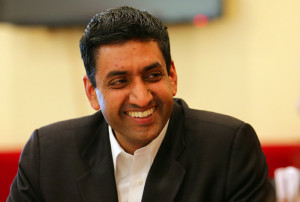
Ro Khanna
Khanna, meanwhile, receives about 26% of the vote in a 3-person match, regardless of whether he is identified as a Democrat or not. This is up from the 5% he received in a March 2013 poll commissioned by Honda, and the 15% he was getting in an August 2013 poll, also by Democracy for America. Khanna’s numbers have been steadily rising, most likely as the result of the massive ground operations that his campaign has been conducting in the last year. Knocking on doors is expensive and time consuming, but considered the best way to get firm voter support.
According to the poll, when Honda and Khanna are matched only against each other, as they’re likely to be for the general election, Honda gets 61% of the vote against Khanna’s 39%. What this means, is that at this stage in the campaign, the Republican vote is split down the middle between the two Democratic candidates (Honda gets a couple of more points, but within the margin of error). As of now, Republicans are not expressing a preference for Khanna. This both brings light as to what Khanna’s strategy has been so far – concentrate in converting as many Democratic voters as possible through personal interactions – and suggests what his path to victory for the November General elections is: continue converting Democrats plus converting the full Republican vote to himself. Given that he still has about $2M in the bank, and there is no indication he has lost the ability to raise more, he has the tools to get there.
First, of course, he has to get past the June primary. The poll numbers put him at a statistical dead even with Singh. But that is only as long as Singh is the only Republican candidate in the race. If another Republican candidate runs, chances are that they will split the Republican vote. There seems to be a high likelihood that this will indeed happen.
In addition to Honda, Khanna and Singh, four candidates have pulled papers to run for the CD 17 race. Geby E Espinosa, a Democrat, seems to be a perennial candidate. He also pulled papers to run for Governor, Secretary of State and Insurance Commissioner in this election, and has run for numerous offices in the past. Dave Chapman ran as a Republican against Ana Eshoo in CD 18 in 2012. The Mark Gonzales who pulled papers in Alameda County, is likely to be Newark patent agent Mark James Gonzales, a registered Republican. Finally, Vinesh Singh Rathore has already paid the $1740 filing fee to run on this race. Now an attorney with Google, Singh Rathore was an associate in the Virgina’s office of Wilson Sonsini Goodrich & Rosati until 2010; Ro Khanna works at the firm’s Palo Alto office. Singh Rathore is registered as a Declined to State.
Once Khanna gets past June, he will still have the challenge of attracting the Republican votes without alienating the Democratic voters whom already backed him. To do so, he is positioning himself as a pragmatist Democrat, and one that will be able to work with both parties. While both campaigns have been taking stabs at each other, Khanna’s strategy may well allow him to win without waging a hard core negative campaign on the incumbent. That may very well be a first.
NEW CA-17 polling via Public Policy Polling (PPP) on behalf of Democracy for America (Feb. 13-16, 2014):
If the election for U.S. Congress were held today, and the choices were Democrat Ro Khanna, Republican Vanila Singh, or Democrat Mike Honda, for whom would you vote?
Ro Khanna………………………………………………26%
Vanila Singh…………………………………………….29%
Mike Honda…………………………………………….. 45%
(Asked of 270 CA-17 voters – MOE 6%)
If the election for U.S. Congress were held today, and the choices were Ro Khanna, Vanila Singh, and Mike Honda, for whom would you vote?
Ro Khanna ……………………………………………… 27%
Vanila Singh ……………………………………………. 11%
Mike Honda…………………………………………….. 62%
(Asked of 235 CA-17 voters – MOE 6.4% )
If the election for U.S. Congress were held today, and the choices were Democrat Ro Khanna and Democrat Mike Honda, for whom would you vote?
Ro Khanna………………………………………………39%
Mike Honda…………………………………………….. 61%
(Asked of 505 CA-17 voters – MOE 4.4% )
If the election for U.S. Congress were held today, and the choices were Republican Vanila Singh and Democrat Mike Honda, for whom would you vote?
Vanila Singh ……………………………………………. 31%
Mike Honda…………………………………………….. 69%
(Asked of 505 CA-17 voters – MOE 4.4% )
Do you approve or disapprove of the way Mike Honda is handling his job as U.S. Congressman?
Approve …………………………………………………. 61%
Disapprove……………………………………………… 31%
No opinion………………………………………………. 8%
(Asked of 505 CA-17 voters – MOE 4.4% )
Note: This article was edited to note Vinesh Singh Rathore’s full name and party affiliation.
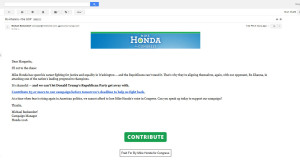 Today Mike Honda’s campaign sent an e-mail to Honda’s supporters (and people like me, who somehow ended up in his mailing list), suggesting that his opponent, Ro Khanna, is supported by Donald Trump.
Today Mike Honda’s campaign sent an e-mail to Honda’s supporters (and people like me, who somehow ended up in his mailing list), suggesting that his opponent, Ro Khanna, is supported by Donald Trump.